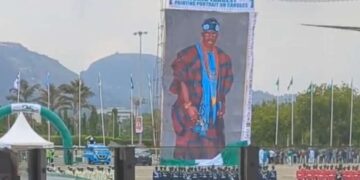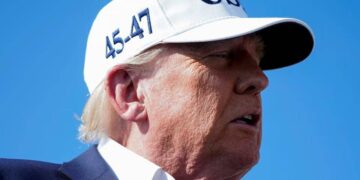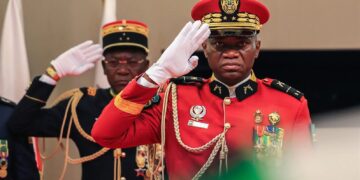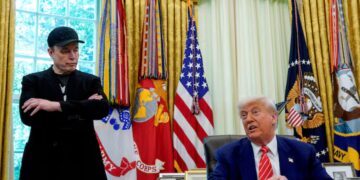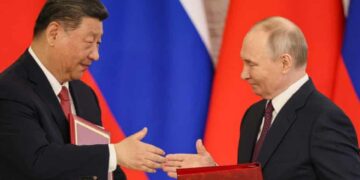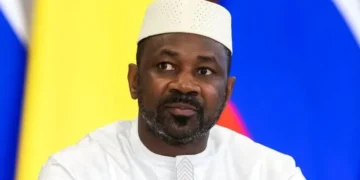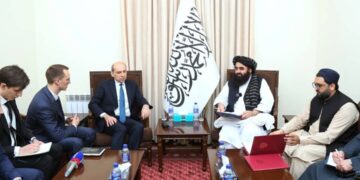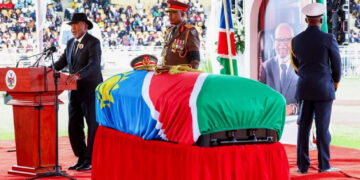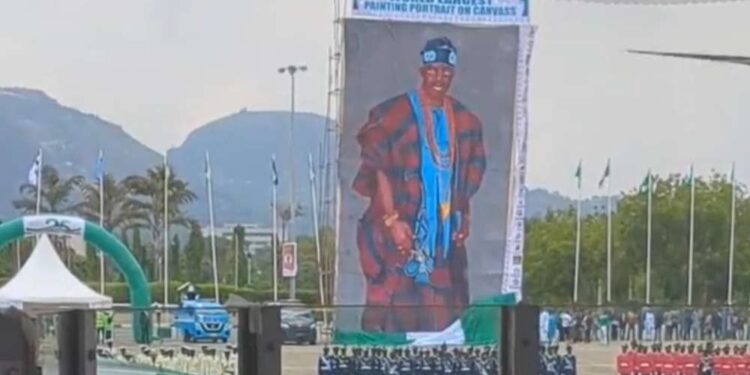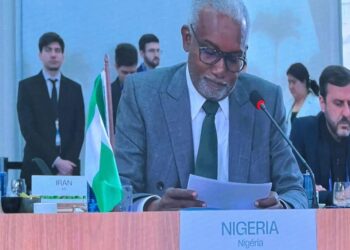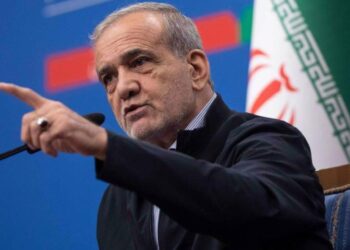By Enyichukwu Enemanna
As Nigeria marks silver jubilee since the return of democracy, the country’s leader, Bola Tinubu on Wednesday unveiled what has been described as world’s largest painting portrait on canvas.
The portrait was unveiled at the Eagles Square Abuja during an event to mark the 25th anniversary of the West Africa largest democracy. The portrait of President Tinubu is said to be the world’s largest painting portrait on canvas.
The project was initiated by the Artefact Gallery, Best Theatre Company and the National Council for Arts and Culture
Mr. Opeyemi Alaba the innovator of the painting described it as a message of hope for Nigerians and Africa. He said that the painting was created by 37 different painters representing the 36 states and FCT.
It has however attracted backlash as many Nigerians question the cost of embark on the project amidst economic woes and record inflation. In their reaction, some Nigerians say despite the “Renewed Hope” mantra of President Bola Tinubu, hope has continued to fade since his assumption of office as the Nigerian leader.
Others view it as a misplaced priority, questioning the timing and the significance of such a grand gesture amidst the country’s disturbing economic and social challenges
For some others, the portrait, intended as a tribute to President Tinubu, is a representation of Nigeria’s rich cultural heritage and its democratic values.
In all, social media platforms have been abuzz with comments ranging from sarcastic commendations to outright bashing.
One user sarcastically congratulated Nigerians, stating that simply viewing the portrait and drinking water would suffice in these trying times. Another spoke with disbelief at the focus on the portrait, urging the government to address more pressing issues like the high inflation rate affecting food prices.
Another user sarcastically said, “What a great achievement! We are doing very well as a country. This will no doubt boost our economy. The government has done well. Mtchew!”
Another expressed frustration with the current economic situation, saying, “Oga President, what kills Nigerians in APC’s rule is border closure, forget about our major rice millers and allow importation of foodstuffs. Having three square meals these days has been classified as a miracle for the common man.”
Majority of comments monitored by Heritage Times HT however indicates dissatisfaction with what is perceived as misplaced priorities. A user noted, “No tangible stuff to be used to celebrate him… one year in office they use a change of national anthem to celebrate him… democracy day they are using this one to celebrate him… we are doomed.”
This probably wouldn’t wouldn’t have attracted the backlash that has trailed it if it bore the image of the nation’s founding fathers who made enormous sacrifices to entrench a rich democratic culture.
The likes of late Dr. Nnamdi Azikiwe, Obafemi Awolowo, Abubakar Tafawa Balewa and others in recent Nigerian history, such as Umar Musa Yar’Adua and Goodluck Jonathan wield higher democratic profile in the minds of Nigerians than Tinubu, a former governor of Lagos State.
Subsidy Is Gone?
Coincidentally, at the same Eagles Square where the President unveiled the portrait of himself was the venue where he announced “subsidy is gone”, referring to the removal of subsidy on petroleum which came with a raft of inflation, following over 300% percent increase in the pump price of fuel.
Months after this, protests hit various parts of the country following high cost of living. Nigerians hit the street arising from the high cost of food items that sank more families into poverty line. They lamented that the Renewed Hope promised by the President became renewed hopelessness, referring to economic policies taken by Tinubu’s predecessor that caused a massive job loss, after several multi-national organizations closed their businesses and left Nigeria.
President Tinubu had promised to take measures to mitigate the impact of fuel subsidy removal, including creating jobs, supporting businesses, alleviating poverty and revamping the economy.
He promised to revamp manufacturing sector by increasing its capacity to expand and create good-paying jobs by injecting N75 billion into the sub-sector.
The objective is to fund 75 enterprises with great potential to kick-start sustainable economic growth, accelerate structural transformation and improve productivity.
Each of the 75 manufacturing enterprises would access one billion naira credit at nine per cent per annum with a maximum of 60 months of repayment for long-term loans and 12 months for working capital.
This was to be carried out with several billions of Naira saved from the subsidy removal. One year after, Tinubu government is yet to commence this policy.
What Democratic Profile?
While he was governor of Lagos State between 1999-2007, he was accused of awarding juicy tax contracts to a company he had interest in, the Alpha Beta Consulting LLP. Till date, the firm still collect taxes on behalf of the state government. It may not be unconnected with the role Tinubu plays in producing governors of the state.
Akinwumi Ambode became the only governor of Lagos State not to have enjoyed a second term in office since the return of democracy in 1999. He lost the ticket of his party, the All Progressives Congress (APC) under controversial circumstances to Babajide Sanwo-Olu who was Tinubu’s preferred candidate.
It is not clear why he denied Ambode a second term in office but it was alleged that it had something to with unfulfilled financial deals that would help Tinubu benefit directly from the state’s funds.
Also in 2012, Tinubu has led a nationwide protest against the plan by then President Goodluck Jonathan to remove fuel subsidy. Tagged “Occupy Nigeria”, a coalition of opposition and civil society organizations led by Tinubu frustrated the subsidy removal and forced the government to revert to old price.
During the protest against police brutality, tagged #EndSARS in 2020 in which several Nigerians were reported killed by security forces at Lekki tollgate, Tinubu was accused of aiding the large mobilisation soldiers who later opened fire on peaceful protesters.
Currency Crisis
Naira has continued its plunge against the dollar this year, with experts pointing to a multitude of factors contributing to its free fall. Earlier in the year, Naira reached a record low of 1,851/$1 at the parallel market. At the official market, it was 1,571.3/$1.
The currency’s decline is linked to factors including heavy reliance on oil and inconsistencies between fiscal and monetary policies, which have strained the nation’s economy.
President Bola Tinubu removed foreign currency controls last June in a bid to get transactions flowing through the official market again to help unify the naira’s exchange rates.
However, this move has only exacerbated the currency’s weakness and added to inflationary pressures.
As the value of the naira continues to fall, it invariably implies that its value in people’s pockets will decrease, meaning they can only buy less with the same amount of money at hand. This has led to a decline in the standard of living.
Woes of Nigerians Students In UK
Last month, Nigerian students studying in Teesside University UK staged protest against their eviction by the varsity authorities over the Naira crisis that has affected their ability to pay tuition fees on time.
Heritage Times HT reports that Nigeria is currently experiencing a record economic crisis in a generation, which has affected its nationals studying at some UK universities.
Inflation is about 34%, and the situation has escalated since inception of current administration when subsidy of petroleum was removed.
The local currency has since depreciated by over 100% against the dollar in nearly a year when President Bola Tinubu was sworn-in.
Teesside University students of Nigerian origin were blocked from their studies and reported to the Home Office after the value of Nigeria’s naira plummeted, wiping out their savings.
Following protests and the intervention of the Nigerian government, the university announced to the BBC that it has re-enrolled some affected students and established a travel fund to help those who needed to return home.
